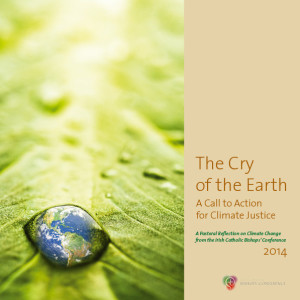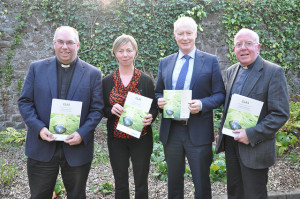
By Sarah Mac Donald - 05 October, 2014
 The Irish Bishops have re-launched their pastoral reflection ‘The Cry of the Earth – A Call for Action for Climate Justice’ to “underline that climate justice is one of the most pressing issues of our times.”
The Irish Bishops have re-launched their pastoral reflection ‘The Cry of the Earth – A Call for Action for Climate Justice’ to “underline that climate justice is one of the most pressing issues of our times.”
Speaking at a press conference in Maynooth, Bishop John McAreavey said the Bishops were conscious that the Church has a responsibility to support efforts to address the consequences of climate change and environmental degradation.
The pastoral reflection was first issued in 2009 but has been updated to include the latest scientific information and take account of the most recent report findings of the intergovernmental panel on climate change as published in April this year.
Pope Francis has paid particular attention to this issue, repeatedly reminding us of our responsibilities to others, Bishop McAreavey said.
The revised pastoral reflection has expanded the faith reflection to include contributions from the Pope including his message for World Day of Peace in January 2014.
The Bishop recalled that in his message, Pope Francis warned of the threats to peace from greed and the arrogance of dominion, possession, manipulation, and exploitation of the natural environment.
He explained that the major contribution of ‘Cry of the Earth’ when it was first published was that it helped the Irish Church understand why and how care of the natural environment is rooted in the Christian faith.
“The document pays particular attention to the role of the Church, emphasising that the consequences of climate change and environmental degradation will always be most keenly felt by the most vulnerable.”
He continued, “We have seen that members of our local Church communities are ready for the challenges of responding to climate change in a spirit of solidarity and in re-launching this document we are recognising the interest and awareness that exists already at local level. We are seeking to support that work by providing easily accessible materials for reflection both from a faith and scientific perspective.”
The Bishop of Dromore then recalled that someone said recently that the Church should stick to faith and leave the trendy issues to others, implying that climate justice was not a faith issue.
“In re-issuing this document the Irish bishops are firmly turning their back on that stance,” Bishop McAreavey warned.
Trócaire’s Director Eamon Meehan explained why the Catholic agency is interested in climate change and climate justice.
“The answer is very simple. Of all of the issues that we deal with in our daily work this issue is very much at the apex. If you take the issues of peace and conflict, poverty, people’s ability to produce food, people’s ability to access water, people’s ability to have a decent life, the pressure on people to migrate away from their particularly rural areas – the issue of climate change, we call it climate justice, is at the apex of those issues.”
He explained that if climate change is about what is happening to the planet, climate justice is about what is happening to the people.
“So for us, this is an issue which is rooted in our mandate and our vision of a just world. It is very much rooted in the issue of the dignity of each and every human being and therefore of the common good. It is something that we face on a daily basis in the work that we do in many countries around the world.”
“When we talk to people who live off the land and who produce everything that they consume themselves, this is something that they spontaneously talk about. These are people who are not particularly well educated and may not be literate but they all talk about the changing climate, the changing patterns of rainfall and of temperatures and their inability in many places to predict weather patterns and how that impacts on their ability to sew their seeds and grow food for themselves.”
According to the Director of Trócaire, Irish people have a responsibility to tackle their carbon emissions which individually are more than 100 times those of the average person in Uganda.
“Sometimes we hear ‘we are so small a country, it is others that need to make the move in this’; but I believe that is not acceptable. We have a responsibility as citizens of the international community,” Eamon Meehan said.
Lorna Gold of Trócaire said it was important to show solidarity with those most affected by climate change.
“The title of the pastoral letter says this is about the Cry of Earth but I would say that this is about the cry of the poor and the cry of the excluded, particularly for the children who reply on the earth to survive. In some ways it is the cry of future generations who have no voice in this debate around climate change and the kind of world they are going to inherit.”
She said that for Trócaire the issue was fundamentally about giving dignity and human rights and the values at the heart of Catholic social teaching.
Recalling the UN climate summit in New York last week which she attended, she noted that Mary Robinson, the UN special envoy on climate change, warned that there are no human rights on a dead planet. “So climate change in some ways trumps the other issues that we are all working on.”
“Many of my colleagues who are working in Africa, Asia and Latin America could tell stories of people who are already vulnerable and are being pushed to the edge by inaction on climate change,” Lorna Gold warned.
She said the Catholic agency had made the “quite difficult decision” to focus much of their advocacy efforts in the coming years on addressing climate justice issues.
 “In some ways we would rather be focused on others issues that ore directly impact on the rights of people but we recognise that as a country we also need to face our responsibilities around climate justice. And that people in the developing world need to be enabled to respond themselves.”
“In some ways we would rather be focused on others issues that ore directly impact on the rights of people but we recognise that as a country we also need to face our responsibilities around climate justice. And that people in the developing world need to be enabled to respond themselves.”
While it is an issue that needs to be tackled globally, it also increasingly requires a co-ordinated response at a local, national and regional level.
She said the necessary change globally would only come about if all players and all nations step up and do their part.
“2015 is a pivotal year. At the end of next year we need to reach a global agreement on what will follow the Kyoto agreement and Ireland, like other European countries, has to step up and play its part.”
According to Lorna Gold, over the coming months Trócaire will be calling on the Irish Government to do a number of things.
“We have a golden opportunity with the climate legislation which is currently going through the Dáil and is expected to be passed by Christmas.”
She warned that the Bill at present is quite weak and there have been proposals for amendments set out by the Environment Committee.
Two specific changes which need to be made relate to the need for an external advisory committee to monitor the implementation of the legislation and reaching zero carbon emissions by 2050.
“This critical piece of legislation will either signal a new approach to tackling climate change or it will perpetuate a business as usual approach,” Lorna Gold stated.
She called on the Irish Government to show leadership at the EU level specifically at the forthcoming EU council meeting at the end of October where the EU will decide on its climate and energy policy beyond 2020.
“It is really important that this is in line with the scientific evidence that indicates that the EU needs to reduce its greenhouse gas emissions between 85 – 90% by 2050.”
She underlined that Trócaire’s advocacy is not just focused on governance.
“We all know that climate change has slipped far down the agenda due to scepticism and a perverse kind of competition between global crises whether it is Ebola, Syria, Iraq.” But she added that “climate change is a global emergency too but it is a silent one and it is incremental.”
Over the coming months Trócaire together with its partners, the bishop’s conferences, parishes and other groups in Irish society, will attempt to stimulate and lead a national conversation around what needs to happen to make the transition to a post carbon society.
“It needs to happen at all levels with all on board. Many groups are already coming up with ideas and proposals and how to adapt to a post carbon society and we will be trying to harness and support those initiatives.”
“Each can play their part in showing solidarity with the most affected. And we can all examine how we can address our own sustainability,” Lorna Gold said.